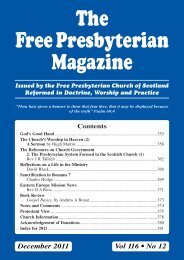March - the Free Presbyterian church of Scotland
March - the Free Presbyterian church of Scotland
March - the Free Presbyterian church of Scotland
You also want an ePaper? Increase the reach of your titles
YUMPU automatically turns print PDFs into web optimized ePapers that Google loves.
TScottish Puritans 83Scottish Puritans 1A Review Article by Rev David Campbellhese two attractively-bound volumes <strong>of</strong> Scottish <strong>Presbyterian</strong> biographiesfrom <strong>the</strong> seventeenth century were originally published by <strong>the</strong> WodrowSociety in 1845. William Tweedie, <strong>the</strong> editor, who collected <strong>the</strong> biographieschiefly from <strong>the</strong> Library <strong>of</strong> <strong>the</strong> Faculty <strong>of</strong> Advocates in Edinburgh, was aminister <strong>of</strong> <strong>the</strong> Disruption <strong>Free</strong> Church <strong>of</strong> <strong>Scotland</strong> in Edinburgh. The originalWodrow Society editions are now comparatively rare and it is to <strong>the</strong> credit<strong>of</strong> <strong>the</strong> Banner <strong>of</strong> Truth that <strong>the</strong>y have placed <strong>the</strong>se excellent volumes into <strong>the</strong>hands <strong>of</strong> today’s reading public. They contain important primary sources for<strong>the</strong> study <strong>of</strong> <strong>the</strong> period and we hope that <strong>the</strong>y have a wide circulation.Both volumes contain detailed explanatory notes regarding <strong>the</strong> origin <strong>of</strong><strong>the</strong> biographies included, and editorial notes are carefully marked, following<strong>the</strong> scrupulous policy <strong>of</strong> <strong>the</strong> Wodrow Society. Similarly, any potentiallydifficult or out-<strong>of</strong>-date words are explained in numbered footnotes. Several<strong>of</strong> <strong>the</strong> biographies contain extended historical footnotes making <strong>the</strong> publicationa mine <strong>of</strong> interesting and valuable historical information. However <strong>the</strong>ir realvalue is in <strong>the</strong> spiritual narratives which <strong>the</strong>y present from an age <strong>of</strong> raregodliness and pious suffering for <strong>the</strong> truth in <strong>Scotland</strong>. We believe that <strong>the</strong>religion represented by <strong>the</strong> wide variety <strong>of</strong> characters – male and female –should encourage <strong>the</strong> pursuit and practice <strong>of</strong> that godliness today.The first volume is largely taken up with <strong>the</strong> writings <strong>of</strong> John Livingstone(1603-1672) and includes autobiographical material, examples <strong>of</strong> his preaching,letters, observations and <strong>the</strong> very interesting “Memorable Characteristicsand Remarkable Passages <strong>of</strong> Divine Providence Exemplified in <strong>the</strong> Lives <strong>of</strong><strong>the</strong> Most Eminent Ministers and Pr<strong>of</strong>essors in <strong>the</strong> Church <strong>of</strong> <strong>Scotland</strong>”. Thislatter work brings out in brief <strong>the</strong> wide range <strong>of</strong> Livingstone’s acquaintancesand almost serves as a biographical dictionary <strong>of</strong> <strong>the</strong> Scottish Church <strong>of</strong> <strong>the</strong>period. John Livingstone himself was a remarkable man and much used <strong>of</strong> <strong>the</strong>Lord as a preacher and witness for truth. A committed <strong>Presbyterian</strong>, like manyo<strong>the</strong>rs referred to in <strong>the</strong>se pages, he suffered banishment for his principlesin 1662. He spent portions <strong>of</strong> his life in Ulster, where, on account <strong>of</strong> <strong>the</strong>Episcopacy imposed on <strong>Scotland</strong>, he was constrained to exercise his ministry.The first volume also contains a brief life <strong>of</strong> <strong>the</strong> godly John Welsh <strong>of</strong> Ayr(1568-1622), a biography <strong>of</strong> Patrick Simson (1556-1618), letters <strong>of</strong> <strong>the</strong> remarkableElizabeth Melvill, or Lady Culross, “The Last Heavenly Speeches1 Scottish Puritans, Select Biographies, edited by W K Tweedie, published by <strong>the</strong> Banner<strong>of</strong> Truth Trust, hardback, 2 vols, 568 and 552 pages, £32.00. All <strong>the</strong> books reviewed in thisissue may be obtained from <strong>the</strong> <strong>Free</strong> <strong>Presbyterian</strong> Bookroom.
















